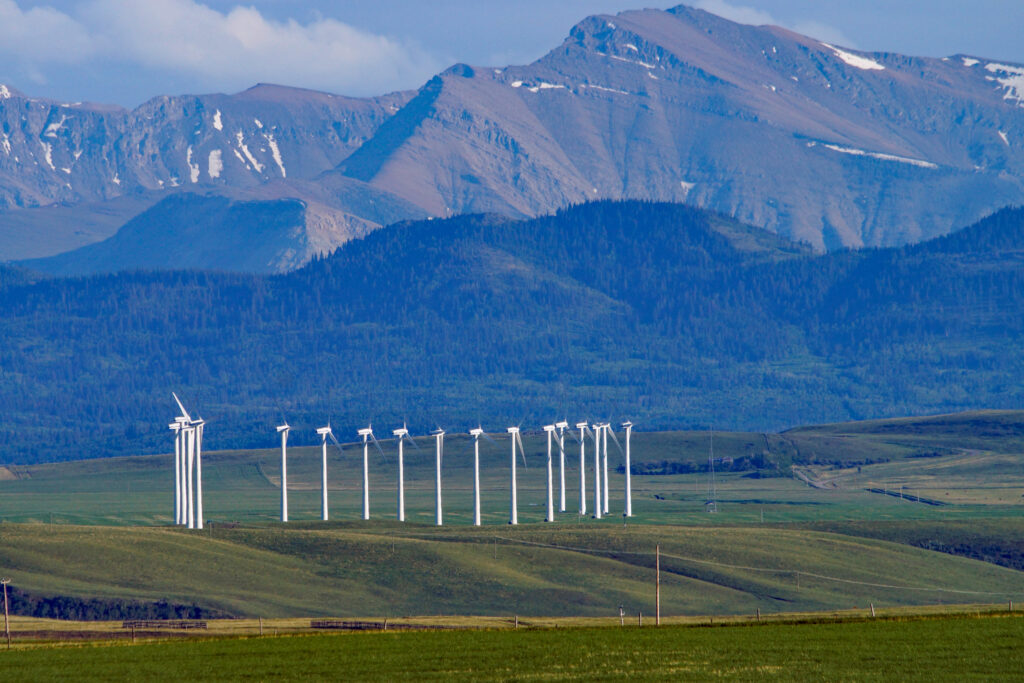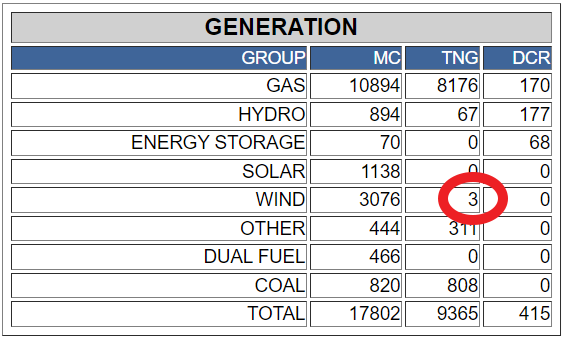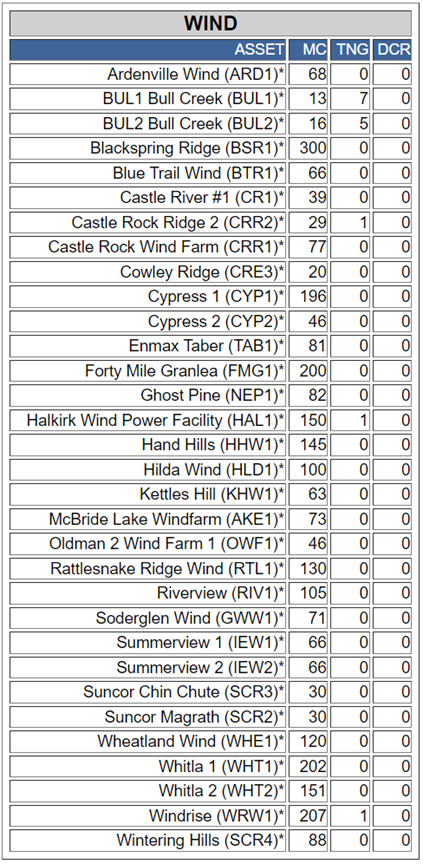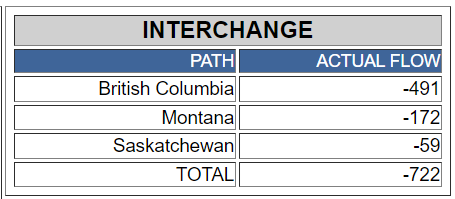Brian Zinchuk is editor and owner of Pipeline Online

Alberta wind turbines. Photo by Clive Schaupmeyer
Suppertime is usually the peak power demand, but supper in Alberta on Tuesday was not likely powered by wind, or solar. Indeed, it was almost exclusively powered by natural gas.
With the recent addition of yet another two wind facilities in Alberta, that province now has in excess of three gigawatts of wind power capacity. Coming in at 3,076 megawatts, Alberta theoretically has more wind capacity available to it than the entire province of Saskatchewan was generating on Nov. 6.

Alberta power production at 12:30 a.m., Wednesday, Nov. 9. MC is maximum capacity in megawatts, TNG is total net to grid, and DCR is dispatched contingency reserve. Alberta Electric System Operator
Except that on Tuesday evening, during the peak supper usage period, Alberta’s fleet of now 32 wind farms was producing just 15 megawatts of electricity, hovering very close to that level for at least the next eight hours. That’s 0.5 per cent, or half of one per cent, of nameplate capacity. And by 12:30 that night, wind power production across hundreds of wind turbines in an area larger than Belgium, Luxemburg and the Netherlands combined was producing just three megawatts.

Alberta’s wind power in installed across an area larger than the Netherlands (red), Belgium (pink) and Luxemburg (green) combined. www.thetruesize.com
At 5:54 p.m., right when supper was on the stove, 27 of the province’s now 32 wind farms were contributing exactly zero megawatts to the grid. Three wind farms were contributing a singular megawatt.

Nearly all of Alberta’s wind farms were producing zero power Tuesday evening. That’s the middle column of numbers. Alberta Electric System Operator.
The low wind persisted until at least 1 a.m. that evening, and wind forecasts expected it to last much of Nov. 9.
That means at midnight, the billions of dollars invested in the hundreds of wind turbines resulted in them all collectively producing 0.1 per cent of their capacity, or one-tenth of one per cent.
- 0111 2026 SK Oil Show booth promo 010111 2026 SK Oil Show booth promo 01
- 0085 Turnbull snow removal call office0085 Turnbull snow removal call office
- 0110 SaskEnergy SEI_Network_Members_Burn_Brighter0110 SaskEnergy SEI_Network_Members_Burn_Brighter
- 0109 SaskPower SASPO_2817_PLT_Recruitment_DIVERSITY0109 SaskPower SASPO_2817_PLT_Recruitment_DIVERSITY
- 0105 SaskEnergy Commitment to Safety0105 SaskEnergy Commitment to Safety
- 0102 Lori Carr Coal Extended0102 Lori Carr Coal Extended
- 0100 Turnbull Project Manager0100 Turnbull Project Manager
- 0099 Mryglod Steel 1080p0099 Mryglod Steel 1080p
- 0097 Eagle Sky Ventures LTD0097 Eagle Sky Ventures LTD
- 0095 Fast Trucking nearly 70 years good at it0095 Fast Trucking nearly 70 years good at it
- 0092 Turnbull projects big and small0092 Turnbull projects big and small
- 0046 City of Estevan This is Estevan Teaser0046 City of Estevan This is Estevan Teaser
- 0077 Caprice Resources Stand Up For Free Speech0077 Caprice Resources Stand Up For Free Speech
- 0061 SIMSA 2024 For Sask Buy Sask0061 SIMSA 2024 For Sask Buy Sask
- 0051 JML Hiring Pumpjack assembly0051 JML Hiring Pumpjack assembly
- 0049 Scotsburn Dental soft guitar0049 Scotsburn Dental soft guitar
- 0041 DEEP Since 2018 now we are going to build0041 DEEP Since 2018 now we are going to build
- 0032 IWS Summer hiring rock trailer music
- 0022 Grimes winter hiring
- 0021 OSY Rentals S8 Promo
- 0018 IWS Hiring Royal Summer
- 0013 Panther Drilling PO ad 03 top drive rigs
- 0002 gilliss casing services0002 gilliss casing services
- 9002 Pipeline Online 30 sec EBEX9002 Pipeline Online 30 sec EBEX
- 9001
The denominator on that equation keeps getting larger, with more and more wind facilities coming online in recent weeks. The latest wind farm additions are Cypress 1 and 2, at 196 and 46 megawatts, respectively.
And as the sun had already gone down past the Rockies at supper time, the province’s solar fleet, which has grown in recent days to 29 facilities, was producing zero power. Alberta now has a nameplate capacity of 1,138 megawatts of solar power. This is up by about 60 per cent compared to last spring.
Hydro was cranking out 340 megawatts.
And, as usual, the province’s four battery facilities totaling 70 megawatts with an estimated cost of close to $100 million were contributing zero power to the grid for most of the evening (SaskPower announced a 20 megawatt battery for $26 million this past spring)
Finally, at 9:51 p.m., eReserve 1 Rycroft was called upon to contribute its full 20 megawatts for 56 minutes. Prior to that, the last time any of those batteries contributed power was for a few minutes each on Nov. 3.
Indeed, according to Dispatcho.app, in the 30 days prior to Nov. 4, those four batteries collectively contributed power to the grid just 339 minutes in total, out of 43,200 minutes available to them collectively (60 minutes * 24 hours/day * 30 days * 4 batteries). eReserve 1 Rycroft produced power just four times in 30 days, for a total of 90 minutes in 30 days. eReserve 2 Buffalo Creek contributed power four times, from five to 16 minutes a crack for a total of 34 minutes in 30 days. eReserve 3 Mercer Hill produced power five times, from five to 16 minutes per occasion, totaling 42 minutes in 30 days. Summerview produced power for more time than the other three combined, but its four periods of usage totaled 173 minutes, ranging from 29 to 59 minutes at a time.
In other words, the four batteries in Alberta collectively output power 0.8 per cent of the time available over those 30 days.
- 0111 2026 SK Oil Show booth promo 010111 2026 SK Oil Show booth promo 01
- 0085 Turnbull snow removal call office0085 Turnbull snow removal call office
- 0110 SaskEnergy SEI_Network_Members_Burn_Brighter0110 SaskEnergy SEI_Network_Members_Burn_Brighter
- 0109 SaskPower SASPO_2817_PLT_Recruitment_DIVERSITY0109 SaskPower SASPO_2817_PLT_Recruitment_DIVERSITY
- 0105 SaskEnergy Commitment to Safety0105 SaskEnergy Commitment to Safety
- 0102 Lori Carr Coal Extended0102 Lori Carr Coal Extended
- 0100 Turnbull Project Manager0100 Turnbull Project Manager
- 0099 Mryglod Steel 1080p0099 Mryglod Steel 1080p
- 0097 Eagle Sky Ventures LTD0097 Eagle Sky Ventures LTD
- 0095 Fast Trucking nearly 70 years good at it0095 Fast Trucking nearly 70 years good at it
- 0092 Turnbull projects big and small0092 Turnbull projects big and small
- 0046 City of Estevan This is Estevan Teaser0046 City of Estevan This is Estevan Teaser
- 0077 Caprice Resources Stand Up For Free Speech0077 Caprice Resources Stand Up For Free Speech
- 0061 SIMSA 2024 For Sask Buy Sask0061 SIMSA 2024 For Sask Buy Sask
- 0051 JML Hiring Pumpjack assembly0051 JML Hiring Pumpjack assembly
- 0049 Scotsburn Dental soft guitar0049 Scotsburn Dental soft guitar
- 0041 DEEP Since 2018 now we are going to build0041 DEEP Since 2018 now we are going to build
- 0032 IWS Summer hiring rock trailer music
- 0022 Grimes winter hiring
- 0021 OSY Rentals S8 Promo
- 0018 IWS Hiring Royal Summer
- 0013 Panther Drilling PO ad 03 top drive rigs
- 0002 gilliss casing services0002 gilliss casing services
- 9002 Pipeline Online 30 sec EBEX9002 Pipeline Online 30 sec EBEX
- 9001
Natural gas kept Alberta lit, but Ottawa wants to end all natural gas power production by 2035
As the batteries weren’t providing power (except for 56 minutes for one battery), nor were solar or wind, and there were only two coal units left in the entire province, hydro was largely held in reserve, natural gas was running nearly full out. Of the 10,894 megawatts of maximum capacity, 9,085 megawatts were in use, with a further 109 megawatts as dispatched contingency reserve.
Notably, the federal government currently has a discussion paper out proposing a new Clean Electricity Standard, which would require all fossil fuel power production in Canada to end except in exceptional circumstances. That would include natural gas, which both Alberta and Saskatchewan have turned to as they have been forced off of coal.
For Alberta at that moment, of its domestically-produced 10,566 megawatts in use at that very moment, 9,898 megawatts came from natural gas and coal, or 93.7 per cent.
This proposed Clean Electricity Standard is a key motivation behind the Government of Saskatchewan’s introduction of the Saskatchewan First Act on Nov. 1. If passed into law, it would allow Saskatchewan to exercise its own jurisdiction on power production and the fuels used.
To backfill, Alberta was drawing 722 megawatts from its neighbours – 491 from British Columbia, 172 from Montana, and 59 from Saskatchewan.

- 0111 2026 SK Oil Show booth promo 010111 2026 SK Oil Show booth promo 01
- 0085 Turnbull snow removal call office0085 Turnbull snow removal call office
- 0110 SaskEnergy SEI_Network_Members_Burn_Brighter0110 SaskEnergy SEI_Network_Members_Burn_Brighter
- 0109 SaskPower SASPO_2817_PLT_Recruitment_DIVERSITY0109 SaskPower SASPO_2817_PLT_Recruitment_DIVERSITY
- 0105 SaskEnergy Commitment to Safety0105 SaskEnergy Commitment to Safety
- 0102 Lori Carr Coal Extended0102 Lori Carr Coal Extended
- 0100 Turnbull Project Manager0100 Turnbull Project Manager
- 0099 Mryglod Steel 1080p0099 Mryglod Steel 1080p
- 0097 Eagle Sky Ventures LTD0097 Eagle Sky Ventures LTD
- 0095 Fast Trucking nearly 70 years good at it0095 Fast Trucking nearly 70 years good at it
- 0092 Turnbull projects big and small0092 Turnbull projects big and small
- 0046 City of Estevan This is Estevan Teaser0046 City of Estevan This is Estevan Teaser
- 0077 Caprice Resources Stand Up For Free Speech0077 Caprice Resources Stand Up For Free Speech
- 0061 SIMSA 2024 For Sask Buy Sask0061 SIMSA 2024 For Sask Buy Sask
- 0051 JML Hiring Pumpjack assembly0051 JML Hiring Pumpjack assembly
- 0049 Scotsburn Dental soft guitar0049 Scotsburn Dental soft guitar
- 0041 DEEP Since 2018 now we are going to build0041 DEEP Since 2018 now we are going to build
- 0032 IWS Summer hiring rock trailer music
- 0022 Grimes winter hiring
- 0021 OSY Rentals S8 Promo
- 0018 IWS Hiring Royal Summer
- 0013 Panther Drilling PO ad 03 top drive rigs
- 0002 gilliss casing services0002 gilliss casing services
- 9002 Pipeline Online 30 sec EBEX9002 Pipeline Online 30 sec EBEX
- 9001
